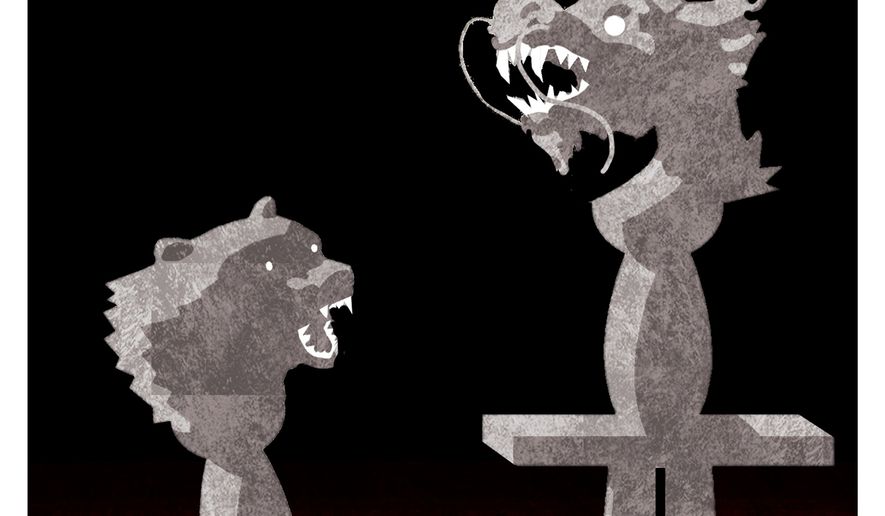OPINION:
President Xi Jinping of China is probably looking at the Russian debacle in Ukraine and thinking, “Putin needs me, but I don’t need him.”
China has ten times the GDP and population of Russia. China produces almost everything, and the Russians don’t produce much of anything except oil, gas, metals, and timber. Russia has almost twice the land area of China (or the U.S., or Canada), but half of the country (Siberia and the Russian Far East) has a smaller total population than the Chinese city of Shanghai.
The Russian army has shown itself to be inept and corrupt, and probably would be easy pickings for the Chinese military. Arguably, the Taiwanese could give the Chinese military a much tougher fight than the Russian military.
Russia became the world’s largest country in terms of land mass because it was endlessly expansionary after the final rejection of the Golden Horde (Mongols) in 1480, who had controlled Russia from 1237. At the time, Russia consisted of the Duchy of Moscow and a few other cities. The various czars stitched European Russia together and then acquired previously Swedish-ruled territory next to present-day Finland. Belarus, the Baltic countries, half of Poland, and some of the now independent countries next to the Black and Caspian Seas were also acquired.
While Americans were acquiring and occupying lands west of the Mississippi River, the Russians were on a slow eastern quest to take the area from the Urals to the Pacific. There were some small tribes of native people in Siberia, but like the American Indians, they were overrun. At the same time, groups of Chinese were going north into Siberia and the Far East of Asia up the Pacific coast. They also encountered small tribes of native people with whom they often co-inhabited. As would be expected, the Russians and Chinese had a series of clashes and battles about who was going to control the Far East.
In 2019, Herman Pirchner, President of the America Foreign Policy Council and Russian expert, wrote a book, Post Putin: Succession, Stability, and Russia’s Future.
The following extremely timely (given what is happening) two paragraphs are from Pirchner’s book: “Following China’s 1685 defeat of Russian forces as Albazin, Beijing won much of the then aboriginal territory that now encompasses much of the Russian Far East and part of Eastern Siberia. Chinese sovereignty over this area was formally recognized by the Russian-Chinese 1689 Treaty of Nerchinsk. However, by the 1850s, China became too weak to defend these territories and Russia conquered them. Russia’s new sovereignty was formally recognized by treaties in 1858 and 1860.
“Notwithstanding a July 2001 Sino-Russian treaty settling outstanding border disputes between them, a map illustrating ‘The Chinese Territories Invaded and Occupied by Tsarist Russia’ continued to hang in Beijing’s Military Museum for several years after. Indeed, as the author observed during several trips along both sides of the Russian/Chinese border in the 2000s, there is a feeling that, at some point, China will move to regain its lost territories.”
The balance of power has once again shifted between Russia and China, with the power going to China this time. Having traveled both to the Soviet Union and to China in the early 1980s, it was very apparent that the Soviet Union (although poor by U.S. standards) was much richer and far more developed than China.
Upon many subsequent trips over the ensuing decades, it was apparent to me that China was rapidly gaining on Russia, having embraced free markets much more enthusiastically, and eventually overtaking Russia in many important areas. (Both the official and unofficial numbers showed the same thing.) Early on, the Chinese relied on Russian weapons and weapon designs for their military. Now, the Chinese are ahead of the Russians in most armaments – in innovation, quality, and quantity. The Chinese have learned to manufacture and globally market most everything. When was the last time you bought a Russian-manufactured product at Walmart or Home Depot?
Many Chinese believe that the Russians stole Eastern Siberia and the Far East, in the same way, they felt that the Portuguese stole Macao and the British stole Hong Kong from them during their period of weakness. China was able to regain Macao and Hong Kong without firing a shot, because neither Portugal nor Britain was perceived to be willing to spend any blood and treasure to keep them, in what would have likely been a losing battle.
The war in Ukraine is weakening Russia, and there is probably no way in which Russia could stop a Chinese occupation of Eastern Siberia and the Far East. So, President Xi probably would only have to make a credible threat of military occupation for Russia to understand the reality and begin to concede certain economic and political rights to the Chinese who choose to move into the disputed area. For political and personal reasons, the Russian leadership would need the Chinese to make reasonable, face-saving concessions in exchange for a slow-motion occupation – which could be done.
Mr. Xi could then claim as his legacy that he almost doubled the size of China – without a war!
• Richard W. Rahn is chairman of the Institute for Global Economic Growth and MCon LLC.




Please read our comment policy before commenting.